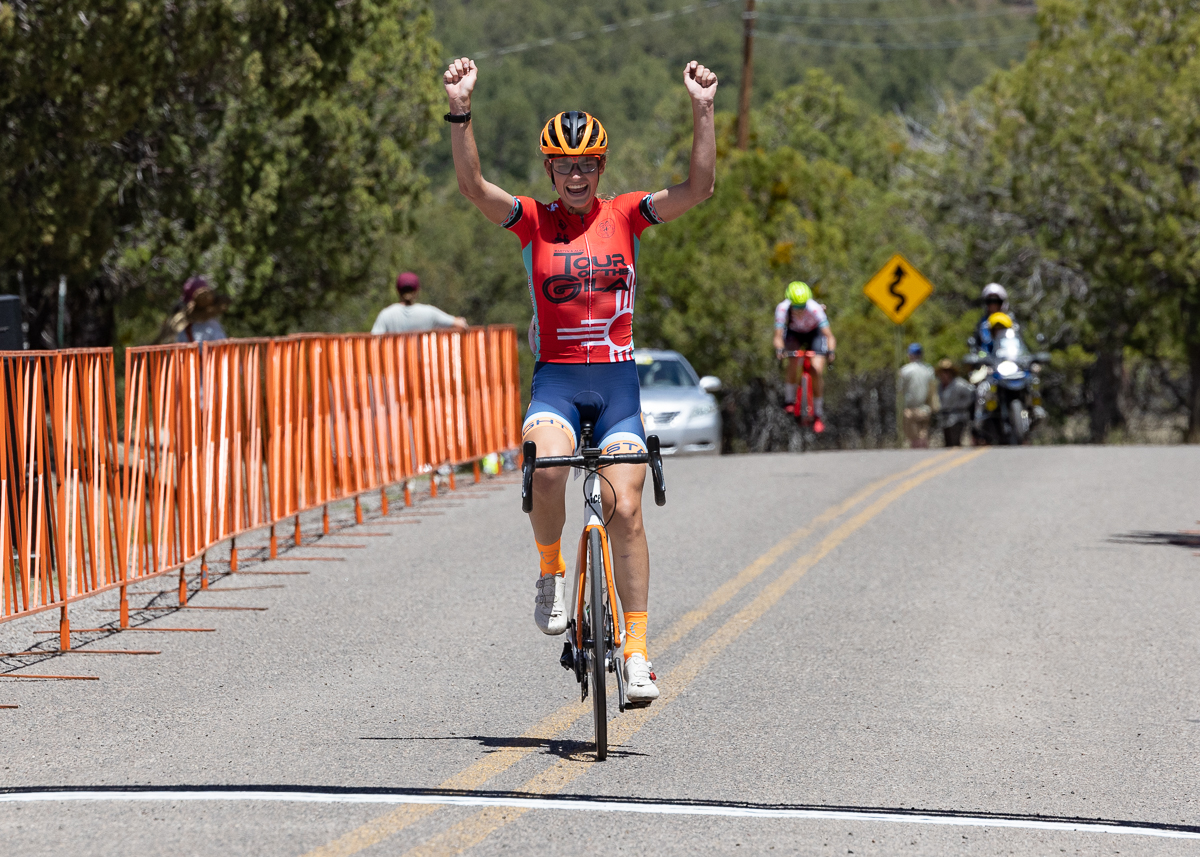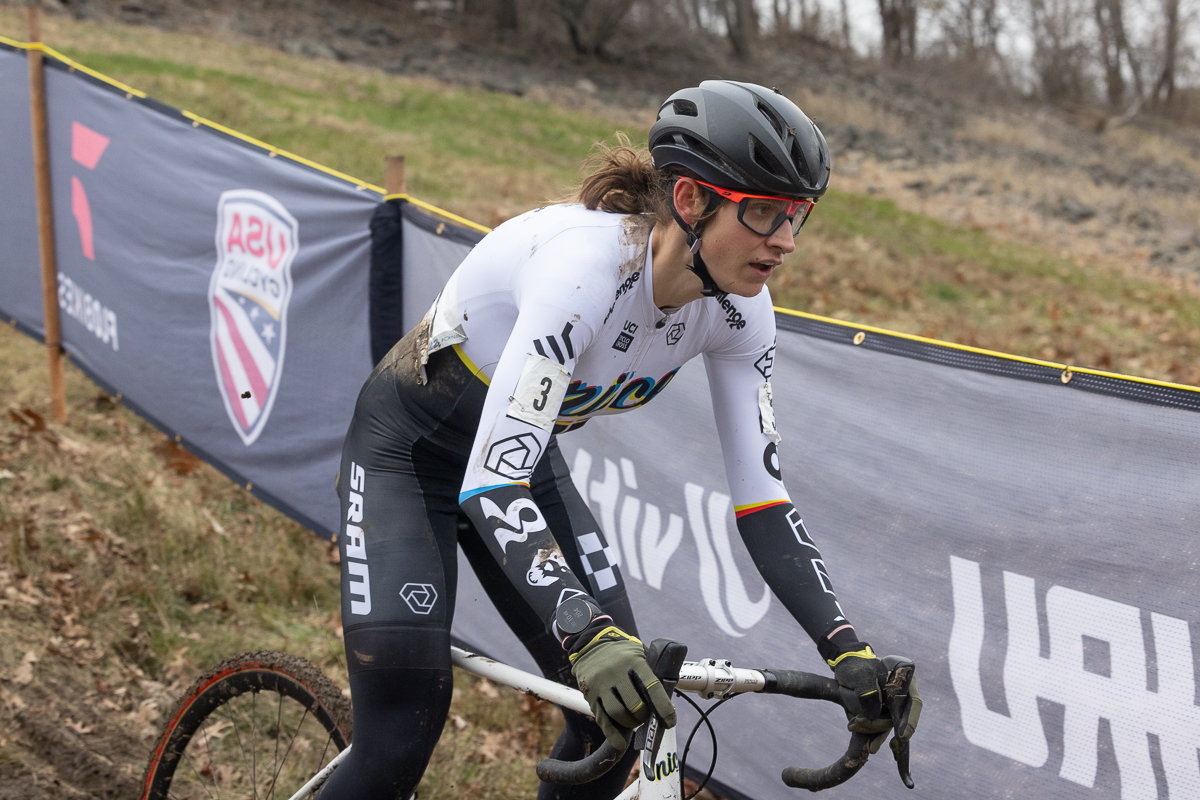
Austin Killips’ overall victory at the long-time American professional cycling stage race Tour of the Gila in Silver City, New Mexico, on Sunday, was met with another wave of controversy surrounding a nearly polarised discussion about transgender rights in both sporting and political arenas.
After five days of racing in the elite women’s category, Killips won the final stage atop the Gila Monster, an ascent that annually brings the event to a close. She secured the mountains classification and the overall victory, becoming the first transgender woman to win a UCI 2.2-registered stage racing event.
In an exclusive interview with Cyclingnews, Killips spoke about the rules governing transgender women competing in cycling, training, support networks, and her potential future in cycling.
“Maybe this is the first Tour of the Gila that a trans woman has won, but we've been out here for a while,” Killips said. ”There is this idea of being the first ones to do things, but it's also like, there are not that many of us, so when the stars align, or we accomplish something notable, the previous ones fall off the collective consciousness. It isn't unprecedented, we've kind of been around for a while, and there have been a lot of people who have paved the way for what I am doing.”
Killips credited her victory to the preparation, training and support from the Amy D Foundation that went into her performance.
“It's exciting. I'm over the moon about it. I structured my entire training block around it, so it feels good to have it come to fruition,” Killips said.
“The special thing about stage racing is that everyone has a special role and something to do, and every day felt like a celebration. Our director put an emphasis on it being a special experience that we had capable people on the team at the race. I'm acutely aware that some doors close on our previous projects and journeys, but it's important to relish in all those moments of joy, process, goals and small steps. The win was incredible, and we were all so happy.”

Killips’ victory could be recognized as a milestone for transgender athletes in sports. However, she said that if it wasn’t for athletes Natalie van Gogh, based in the Netherlands, and Molly Cameron, in the US, she wouldn’t have had a reference point on which to base her aspirations in cycling.
“Existing publicly as an athlete has been new for me over the last couple of years. It is incredibly painful to be othered - queer, trans, non-binary athletes who feel inspired to survive, race and pursue the sport in every way. I'm grateful to have those connections and to meet riders at events, like at cyclocross nationals this year, where they have the non-binary category again. I'm close with a lot of riders, and we feel a sense of solidarity and camaraderie. Even if I wanted to, I couldn't divorce myself from the reality that I'm sharing the world with other queer and trans folks who see what I'm doing, and it has an impact,” said Killips, who aspires to compete on the Women’s WorldTour.
At the Tour of the Gila, Killips finished second in the opening stage from Silver City to the top of the Mogollon Ghost Town ascent,12th in stage 2 in Fort Bayard, and then 3rd in the stage 3 time trial in Tyrone, choosing to use a road bike with clip-on aero bars, where she first took the overall race lead.
The 26km hilly out-and-back time trial has been a staple of the Tour of the Gila where, this year, Emily Enrlich (Virginia’s Blue Ridge-Twenty24) won in a time of 38:15, while runner-up Maeghan Easler (Roxo Racing) finished in a time of 39:24, with Killips finishing third in 39:33.
Killips’ time was the 25th best in the time trial since the 2011 edition, with former world champions Kristin Armstrong (37:13) and Chloé Dygert (37:47) and Ehrlich holding the three fastest times, respectively, all choosing to use time trial-specific bikes.
I know that won’t convince anyone of anything, but the training she did is the thing that’s exceptional about her
Adam Myerson, Killips' coach
Killips went on to maintain her lead through the stage 4 Silver City criterium before winning stage 5 atop the Gila monster in Piños Altos to secure the overall title.
“It's important to acknowledge that I train hard, and it is made public on Strava, a public-facing account with my power and heart rate data all there. You can see where it lines up specifically with other women in the peloton and see a clear and understandable input and output. If you ride your bike six or seven hours a day for five weeks, you are going to get fast. I'm grateful that my body is able to do that. I'm lucky and privileged to be able to train at the level that I train at, and I think there is a clear input and output there that makes sense,” Killips said.
“I have incredible sponsors and a support network that allow me to do what I do, and the hope is that more and more women are able to train professionally, and this is treated as a full-time job. It's a luxury that I don't take for granted. I'm acutely aware that bodies and situations are precarious, and I'm grateful for what I'm able to do with my life right now. I love my friends, I love doing this, and I'll continue to do this because I'm having a nice time in the real world that I share with others.”
Killips has worked with her coach and current Masters US Cyclocross National Champion, Adam Myerson, first in the cyclocross discipline and then in road racing. She noted their collaborative coach-athlete relationship as imperative to her success on the bike, “coaches sometimes occupy a therapist-type role for athletes, so you need someone that you can trust,” she said of Myerson.
Cyclingnews reached out to Myerson for insight into Killips’ preparation in road racing. He confirmed that he believes Killips has shown a normal athletic progression in the time that they have worked together since January 2022. He also noted Killips’ willingness to adjust her job structure, first to remote work and then in her decision to pursue competitive cycling on a more full-time basis to increase her training workload.
“What’s special about Austin is her willingness to do the work and then her capacity for it. Of all the athletes I’ve ever worked with, she’s one of the very few who were willing to structure her life to make the time to do the training required to achieve the goals she was setting for herself and then actually do it,” Myerson said.
“I know that won’t convince anyone of anything, but the training she did is the thing that’s exceptional about her, as well as her character. I asked her to do a workload that would crack most people, and she did it enthusiastically.”
A highly-charged debate

Killips addressed the highly-charged debate between trans rights supporters and groups that aim to protect the women’s category of sport. The debate has reached a boiling point, particularly in the US, as trans inclusion, healthcare, and safety have been at the centre of recent legislation in some states.
“I don't necessarily know how to navigate this conversation. Right now, at this moment in time, it feels that trans people, in general, are a culture-war lightning rod,” Killips told Cyclingnews while on her drive home directly following the Tour of the Gila on Monday.
In recent years, far-right conservative agendas have transformed the political landscape in the US, with laws banning transgender students from participating in sports consistent with their gender being passed in 21 states. Killips referred to the political movement and the associated social media outrage in explaining the response to her success.
In some ways, things are worse than they were 10 years ago, we are a real political target for a scary political movement
Austin Killips
“I don't want to be overly cynical, but I think that trans people in sports, we've seen what has happened politically, they are trying to find a wedge issue, and then immediately it spirals into trying to legislate trans people out of existence. We are seeing bans on [gender-affirming] healthcare for kids and making it almost impossible for adults to access it,” she said.
Killips said she didn’t feel that there was any way to have a discussion with people who are part of this anti-trans movement.
“In some ways, things are worse than they were 10 years ago, we are a real political target for a scary political movement. It's a unique moment in history where there is a category of people that are being very specifically targeted in a unique way. That's not where the right-wing social conservative conversation was 10 years ago, they just didn't shine a spotlight on us as the thing to hyper-fixate on. They are working toward an end, with an outcome in mind and a vision of the world, I don't think they are budgeing, they are engaged in a power struggle and willing to have blood on their hands and casualties from the fear and hate-mongering that they churn up.”
Inclusion and fair play
In professional cycling, Killips is permitted to compete at UCI-sanctioned events in accordance with the policies set by the International Cycling Union (UCI) and USA Cycling, and the guidance of the International Olympic Committee (IOC). The UCI’s most recent guidelines came into effect in 2022, which stipulate that transgender women athletes must declare that their gender identity is female, demonstrate that their total testosterone level in serum has been below 2.5 nmol/L for a period of at least 24 months, and then remain at 2.5nmol/L throughout the period of desired eligibility to compete in the female category.
Following Killips’ victory at the Tour of the Gila, the UCI defended its guidelines, which have been criticised by some groups that aim to protect the women’s category in sport, but it noted that the rules could evolve along with more scientific research, saying, “The UCI acknowledges that transgender athletes may wish to compete in accordance with their gender identity. The UCI rules are based on the latest scientific knowledge and have been applied in a consistent manner. The UCI continues to follow the evolution of scientific findings and may change its rules in the future as scientific knowledge evolves.”
USA Cycling has confirmed to Cyclingnews that Killips complies with USA Cycling’s policy and UCI Regulations. Killips also confirmed to Cyclingnews that her body is below the total serum testosterone level of 2.5nmol/L and that she is fully compliant with the sport governing bodies' rules which allow her the right to compete in elite women’s racing.
“I've been well within the threshold, being on Hormone Replacement Therapy (HRT), to compete by the IOC/UCI standards. Being on HRT is imperative, and my performance continues to track within that bandwidth of elite women's performance. I know that my body doesn't produce any testosterone, but there is a concern about the weaponization of these metrics against other people,” said Killips.
The IOC set in place guidelines from which International Federations such as the UCI can draw from when creating their own policies on transgender women competing in sports. It replaced the controversial 2003/04 Stockholm Consensus that required transgender women to undergo sex-reassignment surgery if they wanted to partake in women's category competition, recognizing this as a human rights violation. Such individuals were also forced into humiliating forms of gender verification processes to obtain licences under their sporting federations.

In 2015, new guidelines were introduced that incorporate athletes who have 'differences in sex development' (DSD). Some sporting federations, such as the World Athletics, have recently placed hormonal regulations on DSD athletes whereby they must reduce testosterone levels for six months to compete in any competition sanctioned by the organisation.
The history of sport governing bodies policing gender boundaries has a history of testing protocols that have been humiliating and intrusive. High-profile cases of India’s track and field athletes Santhi Soundarajan, Dutee Chand and more recently South Africa’s Caster Semenya have highlighted the need for both fairness, inclusion and more scientific research.
“When I see women who have historically been at the margin, whose athletic talent gets cut down because we are saying they're also not biological women, that's something I find deeply concerning. I want to make sure the data points we are using aren't … or we are using sampling that is genuine, and models that are inclusive, and not defining other people out of existence because these tests are being done in the West,” Killips said.
“I worry that we narrowly define womanhood and take away the right to compete against people who have historically been marginalised and whose athletic success has been historically undercut by a metric used to push them out of categories. This is genuinely the biggest point of concern that I have and a development that I feel uneasy about. I know that there is dialogue around it, but I would hope that there is more critical scientific work done around it.”
I worry that we narrowly define womanhood and take away the right to compete against people who have historically been marginalised
Austin Killips
While the guidelines on transgender participation in sport trickle down from the IOC, the International Federations’ structured policies differ between sports. World Athletics and World Aquatics have recently announced that transgender women who have gone through male puberty can no longer compete in the female category at international events.
Likewise, British Cycling suspended its transgender and non-binary participation policy last year, denying transgender women the opportunity to compete in domestic women's races until the policy was reviewed. On Tuesday, The Times in the UK reported that British Cycling is considering a full ban on transgender women competing in women’s races in a new policy scheduled to be published in May, which would be different from the current rules set out by the UCI. However, the report notes that the policy would also ensure opportunities for transgender cyclists in competition.
It has been suggested that the open category could be created, while the women’s category would be restricted to cyclists that are born female, which would follow British Triathlon. According to The Times report, a working group set up to agree on the new policy was tasked with speaking to female cyclists, the transgender community and other British sports, as well as British Cycling members.
It has also been reported in the Belgian press that the UCI has considered the possibility of creating a third category in cycling. However, UCI Medical Director Xavier Bigard confirmed to Cyclingnews that this information is not correct and that it has not been discussed at the sport governing body.
“There is currently no discussion within the UCI about a third category for transgender athletes. Our rules have been changed and strengthened in June 2022. They are consistent with the current state of our scientific knowledge on this topic. The proof is that international federations have recently corrected their rules in accordance with ours,” Bigard told Cyclingnews.
“If one day, in the future, we have scientific proof that transgender athletes cannot lose the advantage given by testosterone during puberty, and despite a long duration of testosterone-blocking treatment, we could discuss this possibility. But this is absolutely not the case at the moment, and there is no discussion within the UCI about this eventual possibility.”
Following the recent UCI Management Committee Meeting in May, the sport governing body announced that it would analyse the current situation by reopening consultation with the athletes and National Federations.
"Members, therefore, agreed to debate and take an eventual decision at its next meeting, in Glasgow, in August. The UCI's objective remains the same: to take into consideration, in the context of the evolution of our society, the desire of transgender athletes to practise cycling. The UCI also hears the voices of female athletes and their concerns about an equal playing field for competitors, and will take into account all elements, including the evolution of scientific knowledge," stated the UCI.
Building a dialogue

A backlash across social media platforms during the Tour of the Gila, gave way to the discussion surrounding a growing need for sports organisations to step in to offer a safer place with which athletes, teams and governing bodies can hold healthier conversations on fairness and inclusion in sports, while also be able to ask questions and share important information.
Killips doesn’t believe that this type of discussion is possible on social media platforms like Twitter.
“For the most part, I locked my [Twitter] account so that I wouldn’t get an endless stream of notifications. It's like a cultural war, a group of people that are ideologically motivated, and it's kind of a coordinated thing on the internet, so I try to opt out of participating in it. I don't think it's good faith to sport,” Killips said.
“I’m happy to talk with people who want to talk. If there is one thing I enjoy, it's having conversations about ethics, and I'm here for dialogue. But dialogue doesn't happen on the internet. I felt that they were personal attacks that were deeply impersonal. If it wasn't [directed] at me, the same string of words would be hurled at another athlete. I don't find solace in it, but I'm aware that [the comments on social media] is a political machine steam roller, and not genuinely being in-conversion with another person and trying to understand them.”
Some riders and teams feel that the policy on transgender women competing in the elite women’s category in cycling has not been addressed enough with currently-participating athletes or teams when they were first created and then revised last year.
In addition, some riders have indicated that they are not comfortable seeking information, asking questions or speaking publicly about their views on the issue because of its contentious nature and that there is a fear of being misunderstood and a potential to lose sponsorship.
Some also have questions about whether transgender women retain advantages from going through male puberty, in competition, even after undergoing gender-affirming hormone therapy.
Last December, Cyclingnews reached out to several riders in the elite women's field ahead of the USA Cycling Cyclocross Championships, and few agreed to go on the record about their views on racing with trans women.
Clara Honsinger took a diplomatic approach, telling Cyclingnews, "It's just a really difficult situation" and "It's up to the UCI to make the proper call,” while Raylyn Nuss described the topic as "the big elephant in the room.”
I'm here for dialogue. But dialogue doesn't happen on the internet. I felt that they were personal attacks that were deeply impersonal
Austin Killips
"No one's coming to the athletes and asking us how we feel about it," Nuss said to Cyclingnews. "I almost wish we could just have a panel discussion with [the trans women] in a safe space. And we could all just ask a bunch of questions, and just clear the air more or less, and then just proceed on as normal.”
Following the US Cyclocross Championship event in December, cyclist Hannah Arensman reportedly retired from the sport after finishing fourth place behind Killips.
“I feel for young girls learning to compete and who are growing up in a day when they no longer have a fair chance at being the new record holders and champions in cycling,” Arensman confirmed her decision to retire in a Supreme Court filing in support of a West Virginia law that seeks to keep transgender student-athletes at all level of competition to play against those with the same gender assigned at birth, instead of the gender with which they identify.
Arensman also expressed her views on the current rules on trans women competing in cycling by the UCI and USA Cycling, “I have felt deeply angered, disappointed, overlooked, and humiliated that the rule makers of women’s sports do not feel it is necessary to protect women’s sports to ensure fair competition for women anymore.”
At the Tour of the Gila, the Amy D Foundation team director confirmed to Cyclingnews that there were no official complaints or protests against the team or Killips during or after the races. She also said that while her experience within the peloton was “overwhelmingly positive,” she recognizes the need for healthy dialogue.
“Talking to everyone at the race, and I know there was a huge hubbub happening on Twitter, but everyone here was having a nice time together. There was a sense of solidarity in the peloton and a place where I actively enjoy being,” she said.
In a statement from the Tour of the Gila to the media, it said that it "recognises the passionate debate regarding rider eligibility and classifications of riders set by UCI and USA Cycling and encourages UCI and USA Cycling to host an open discussion on the matter.”
Killips said that there isn’t just one way to have a conversation about the policies in place surrounding trans women competing in sport, whether it's through the sport governing bodies, smaller group discussions, or longer one-on-one time could all be a more positive and productive way forward.
“I’ve had a lot of productive conversations with people in person who have complicated feelings about it. People that I have raced with or developed relationships with over time through talking and training and being in the vicinity with one another, talking face-to-face and experiencing that empathy that comes with real community connection. I found that there are productive conversations to be had,” Killips said.
“One-on-one conversations take place over the course of time and are about building relationships and mutual understanding, there is a particular disposition that both parties need to adopt, and are willing to be critical, open, and truly see the humanity of the other.”







